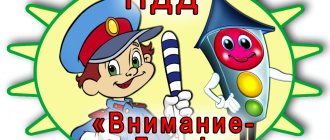From the author
Familiarizing children of senior preschool age with the professions of adults is one of the important tasks of a child’s socialization. The idea of professions allows children to penetrate deeper into the world of adults, understand and accept it. It creates an interest in work, gives birth to a dream about one’s own future, and makes it possible to be proud of the results of the work of one’s close relatives and people in general. The transformation of the world of professions clearly shows children how scientific thought develops and technological progress takes place in society and the world. Experiencing the influence of the results of adults’ work on themselves, children practically realize its significance. Work for everyone becomes clear to a child of senior preschool age; socialization of the results of the work of adults helps him understand the interdependence of people in a social community.
The reflection of the work of adults in role-playing games shows the importance of this area of cognition for children.
The relevance of the formation in children of primary ideas about work, its role in society and the life of each person is justified by the Federal State Educational Standard for Education.
The range of professions that older preschoolers are introduced to is quite wide. However, the teacher cannot introduce children to every profession by organizing excursions and targeted walks. Thematic dictionaries, visual aids, material from the Internet and, of course, stories, poems and fairy tales come to the rescue.
Only a combination of different methods and forms can produce results. It is necessary to interest preschoolers so that they have a desire to understand the topic as deeply as possible, come into contact with it personally, and dream of trying themselves in this area of human activity.
The author offers several methodological guides to familiarize children aged 5–8 years with professions. The books under the general title “Let’s Play in the Profession,” published by the publishing house “TC Sfera” in 2015, systematize activities, games, poems, riddles, physical education, and gymnastics for the designated professions. This book is a good addition to these manuals.
The author tried to show the relationship between people of different professions working at the same enterprise or in the same field of activity.
Children's stories with a plot are more relatable and understandable to a preschooler. They help you look at the professional activities of adults through the eyes of a child and connect your personal experience.
Descriptive stories include more necessary information, but require children to concentrate, process information, and memorize.
All stories contribute to the development of children's speech. The teacher’s questions and tasks after reading are aimed at developing the ability to reason, draw conclusions, tell a story, correctly construct sentences, enrich and activate the vocabulary.
The sections contain goals, each story has a methodological part with questions, tasks and vocabulary work. Interpretation of concepts at the end of each section will help teachers most accurately and correctly explain the meaning of words used in stories, and children will enrich their vocabulary. In the texts, words for vocabulary work are highlighted in italics.
Several stories are offered about each profession, which allows you to reveal it more deeply. When writing them, the author relied on material from encyclopedias, Wikipedia, federal laws, job descriptions, qualification requirements for positions, and dictionaries. Some stories can serve as the basis for construction games, for example, “Railway Station”, “Port”, etc. Educational material about technology and the heroics of everyday life of people of different professions has been selected especially for boys. For example, in the description of the profession of a sea captain, various commands are used for interaction between sailors on a ship, which children can use in their creative games.
The amount of material offered to children is determined by the teacher. Of course, long stories need to be read in parts. Stories require discussion of individual points as you read, consideration of numerous examples. Concepts unfamiliar to children can be discussed before reading, but be sure to clarify them again during the reading process. Professions such as journalist and media worker are difficult for children to understand, so relying on specific material available to them, including video, is mandatory.
The author wishes teachers and children an exciting journey into the world of professions.
How to make a project on the topic “Professions” on the world around us for 2nd grade.
How to do a project on “Professions” in a workbook (template)
In the workbook on page 82 you need to write a short story about the profession of your close relatives, for example about the profession of your mother or father, grandfather or grandmother.
The story should begin with the words:
My mother (father, grandfather, uncle, etc.) works...
This is a very interesting and important profession. She performs the following work: ....
In this profession it is important to be able to...
This profession requires qualities such as...
I really like my mother's profession.
On page 83 in your workbook, you should create a plan for speaking at the presentation. The plan should consist of 4-5 points and correspond to the presentation itself.
An example of a presentation plan:
On the same page in your workbook, you should evaluate your work on the project.
Example of project work evaluation:
Working on this project was successful and very interesting. I learned a lot about the profession of my mother (father, another relative). My mother helped me with my work, and she spoke very interestingly about her profession.
And in conclusion, we should express gratitude for your help in the work.
Example of gratitude for help:
I thank my mother, Elizaveta Petrovna, for her help in preparing the presentation, useful information, and valuable advice.
An example of a finished project on the topic “Professions”
An example of a presentation plan:
An example of a speech at a presentation for a project, a description of the accounting profession:
My mother, Elizaveta Petrovna, has been working as an accountant at an industrial enterprise, the Tekhnosila plant, for twelve years. The accounting profession is very important for the plant and for the whole society.
Mom calculates various indicators of the enterprise’s performance, calculates salaries for employees and herself, takes into account material assets, plans expenses, and does a lot of other interesting work.
My mother specially studied to be an accountant at a technical school and now knows how to count very well and never gets confused with numbers.
For the work of an accountant, such qualities as perseverance, patience, attentiveness, and the ability to concentrate on the work being performed are important.
I really like my mother’s profession and I would also like to become an accountant when I grow up. Because I like math and I like solving math problems.
Example of project work evaluation:
Working on this project was successful and very interesting. I learned a lot about the accounting profession. My mother helped me with my work, and she spoke very interestingly about her profession.
Example of gratitude for help:
I thank my mother, Elizaveta Petrovna, for her help in preparing the presentation, useful information, and story about the accounting profession.
Example of a presentation for the project:
Source
Educational stories for children 5–8 years old
Postal workers
Tasks:
– reveal the importance of the postal service of the Russian Federation and its workers, show how postal communication allows people to receive information and exchange it on an equal basis while maintaining the secrecy of correspondence, send and receive necessary goods, money orders, magazines and newspapers (new information), pensions; contact any location in the world; receive additional services;
– introduce postal workers, their job responsibilities, significant personal and professional qualities, and the rules for sending correspondence;
– provide basic knowledge on postal history;
– develop focused attention, auditory perception, memory, dialogic and monologue speech, enrich and activate the vocabulary;
– develop the ability to use your personal experience in a conversation, draw conclusions, express judgments;
– to form a respectful attitude towards postal workers and interest in their activities.
How Anya began to understand her mother
Anya's mom works at the post office as a telecom operator
first class. She has so much work that by the end of the day she is simply overwhelmed. Anya could not understand why her mother was so tired. She was offended when her mother refused to play with her in the evening and went to her room.
One day, the kindergarten that Anya went to was closed for renovations. The mother had to take her daughter with her to work because there was no one to leave her with at home. The mother sat her daughter at the table, gave her a sketchbook, paints and pencils, and asked Anya not to make noise and not to distract her from her work. The girl drew a little, she got bored, and she went to inspect the post office.
The post office where Anya’s mother worked was small and served one of the city’s microdistricts. There were only two booths for long-distance telephone communications.
. In these booths it was possible to talk on the phone with family, friends or business partners living in other cities.
Two more telecom operators, a post office manager and two postmen worked with my mother. During the day, these several people did so much work that Anya even felt dizzy.
Telecom operators, including Anya’s mother, worked with visitors, postmen and workers from the main post office - the most important post office in the city.
Anya approached the department where telecom operator Maria Ivanovna worked. She received and packaged parcels
and
parcels
, entering all the data about them into the computer.
She also gave out parcels and parcels to visitors who came to the post office to receive them. Maria Ivanovna carefully read receipt
and checked it against the passport. Anya asked her:
– Maria Ivanovna, why don’t you immediately hand over the parcel, but instead carefully read some papers?
“I read the recipient’s receipt and passport so carefully so as not to give the parcel or parcel to the wrong person for whom it is intended,” Maria Ivanovna answered seriously. – I also weigh parcels and parcels to check the accuracy of the weight, and check for any damage to the packaging.
“And I would simply give the parcel to the person who came for it,” said Anya, “then there would be no line at all.”
“You can’t do that,” Maria Ivanovna answered in an edifying tone. – Would you like it if someone else received your package or if the toy you were waiting for fell out of it along the way? Do not ask silly questions. Better help me put the parcels in the mail bag. Add and count. Then you can tell me how many are in the bag. Anya got down to business with pleasure. The parcels were not as heavy as parcels, so the girl easily completed her task. She could only count to ten. When there were ten parcels in the bag, Anya told Maria Ivanovna about this.
“Well done, Anechka,” the operator praised the girl, “she completed my task well.” I hire you as my assistant.
“You’re welcome,” Anya answered, “but I still need to help the others.” They should also have assistants.
And Anya went to the department where telecom operator Elena Petrovna worked. There was a long line at her window.
- Why is there such a long line for you? – Anya asked Elena Petrovna.
– Because everyone wants to quickly pay rent or receive a pension
, child benefits,” Elena Petrovna answered, without looking up from the computer and receipts.
Anya immediately realized that Elena Petrovna could not be distracted because she was counting money. The girl went to see what her mother was doing. She quietly sat down next to her and began to watch her mother work. First, mom accepted a stack of registered letters
from a girl.
stamps
on them and entered all the data into the computer.
Then the mother ran a receipt and took money from the girl for sending letters. The grandmother came up to her mother’s window to pick up the girl. She wanted to subscribe to the magazine “Our Garden”. Mom helped grandma fill out the receipt and charged her for the year. Next in line was a woman who bought an envelope, postcard
and stamps from her mother, and the man behind her sent
a money order
. The young man, who was in line behind the man, received a money transfer by presenting his passport.
Anya’s mother did not have a single moment when she could rest. The line didn't end. Working with visitors seemed very difficult to Anna. Elderly people, who had difficulty seeing and hearing, had to explain things for a long time and help in processing postal items. Others wanted to quickly buy an envelope or stamps without waiting in line. People constantly came up and needed to answer some question.
Anya’s mother tried to be polite and reserved with everyone. All visitors were pleased with her and thanked her for her work. Anya wondered how her mother had enough time and patience for everyone?
It's finally time for lunch. Anya, along with her mother and other operators, was able to rest and eat.
In the afternoon, Anya took a closer look at the work of telecom operators with a computer. postal items into it.
and receiving them. Working on a computer required constant attention and concentration. By the end of the day, the operators' eyes were very tired, and their backs hurt from tension. Anya really wanted to help the operators, but, unfortunately, she did not yet know how to use a computer, and children are not allowed to do such responsible work.
Anya realized that the work of her mother and other telecom operators is very responsible. If they format the mail incorrectly, it will not reach the recipient, but will be returned or may be lost. No one would want their letter or parcel to fail to reach its destination.
Anya helped her mother put registered letters into a pile, and then went to the postmen’s room. Together with them, she put newspapers and magazines in compartments on large shelves and in special boxes for those people who go to receive letters, newspapers and magazines by mail. Such boxes
are called
subscriber ones
. But the girl was not allowed to distribute her pension, which postmen deliver to grandparents’ homes. Money is not for children. The postmen left to deliver mail and pensions to homes, and Anya was left alone. She was so tired during the day that she fell asleep right on the chair.
The working day ended, and mother and daughter went home. On the way, we still had to stop at the store to buy groceries, but we had almost no energy left for that. In the evening, Anya no longer felt like jumping and running. Only now did she realize how tired her mother was. The coloring book that the mother bought for her daughter in gratitude for her help remained on the table until the next day.
After the girl went to her mother’s post office, she began to take care of her. Every evening she ran to meet her, brought her slippers, helped her hang up her clothes, and cooked her dinner. Anya wanted her mother to rest and relax after a hard day at work.
Despite the fact that Anya found the work of a telecom operator difficult, the girl liked it. Doing something for people is so important!
Questions and tasks
● Why was Anya offended by her mother? Where did Anya's mother work? What was her job?
● Why did Anya end up at the post office with her mother? What kind of work did Anya’s mother have to do during the working day? What difficulties did she experience in communicating with visitors? What kind of work did other telecom operators do?
● What should a telecom operator be like to do his job well?
● How did Anya behave at the post office? Why did the daughter change her behavior and attitude towards her mother?
● Did you go to the post office with your parents? Tell me.
Vocabulary work:
telecom operator, PO box, receipt, postal item, long-distance telephone communication, parcel, parcel post, registered letter, envelope, postcard, stamp, pension, money transfer.
Car with a white stripe
One day, Vitya and his dad went, as usual, to the railway station to watch the passing trains. This was their favorite pastime. Dad told his son a lot about trains, their purpose, and distinctive features. Electric trains, long-distance passenger trains, and freight trains rushed past.
Suddenly Vitya saw a carriage with a white diagonal stripe on a blue background, an emblem and the inscription “Russian Post”.
-What kind of carriage is this? – Vitya asked his dad. - Somewhat strange, not like everyone else.
- This is a mail car
, - answered dad.
– don’t you know about this? Then I'll tell you. By rail, postal items
(parcels, parcels, letters)
are transported by
postal and baggage trains and postal cars as part of fast passenger trains.
So that everyone can recognize mail trains and carriages, they use distinctive signs: a stripe, an emblem
and an inscription. You saw these signs on the mail car. But you didn’t notice the special beacons that light up and blink. They are called flashing ones. This is also the insignia of the mail car.
“By the way,” dad added, “mail is transported not only by rail, but also by road, air and water transport.” And everywhere such transport is provided with unhindered passage to post offices and post offices.
The train with the unusual carriage stopped. From it, postal workers began to unload bags, load them onto carts and take them somewhere. Vitya noticed that the carriage was guarded by armed men.
- Dad, why are they unloading some bags from the mail car? Why is he being protected? – he asked his father.
“Let’s go up to the carriage and ask the postal workers what they are doing,” the father suggested.
They approached the carriage when the unloading had already finished. Turning to one of the workers, they learned that he was the head of the traveling crew. The boss, whose name was Ivan Vasilyevich, liked that the little boy was interested in his work. He enjoyed talking with father and son and talked about transporting mail by rail.
“Working with mail is very responsible,” Ivan Vasilyevich began, “not a single letter, not a single parcel should go missing or go to the wrong address.” traveling teams transport mail by rail.
with a boss at the head.
They employ conductors and electricians
of mail cars.
You, Vitya, probably know that electricians work with electrical equipment. They service electrical installations that move postal cargo
. There is so much of it and it is so heavy that it would be very difficult to carry so much mail by hand.
In addition, the postal cargo needs to be unloaded
and load it into
the carriage
train
schedule , because all trains on the railway arrive at the station and depart from it at a strictly defined time.
“Vitya, would you like your grandmother to receive, for example, the parcel you sent on time and safely?” – Ivan Vasilyevich turned to the boy.
- Of course I would! - the boy exclaimed. “Otherwise grandma will be very upset.”
– Every person is interested in ensuring that his postal item is delivered on time, is not lost, torn, unstuck, or opened by anyone other than the addressee. What is being done at the post office for this? – continued Ivan Vasilyevich. – Postal items are securely packaged in durable containers (bags) made of cellophane, boxes made of cardboard, special material or plastic. For each postal item, telecom operators issue a receipt and enter information about it into the computer. No strangers can get into the postal vehicle, carriage, or postal premises on the plane
or on
a sea vessel
.
These premises are also equipped with a special alarm system
.
It serves as security
and warns of fire. In addition to the alarm system, there is also an entire postal security unit staffed by armed guards.
What a serious matter this is - transporting mail! Grow up quickly, Vitya, and come to work with us.
“I never thought that mail needed to be protected,” Vitya said thoughtfully, “I thought that only some military facilities needed to be protected.” What a responsible job you have! Can I shake your hand? – the boy turned to Ivan Vasilyevich.
Ivan Vasilyevich smiled, but extended his hand to the boy. His hand was big and strong. Vitya remembered this handshake for a long time. Now, when trains rushed past him and his dad, he always highlighted the postal trains to himself and remembered the conversation with the head of the mail car.
Story about profession: manager
An employee comes up to me with the question: “Tell me, who am I?” I answer: “Manager.” He, puzzled: “Yes, I know. We are all managers, and my grandfather was a manager...” He wanted to understand what he is an expert in, what makes him unique? Indeed, a manager is a “basic” and widespread business profession. It is so widespread that sometimes it seems that it is not even a profession, but a “substrate” for many professions and activities in business, a basic skill, a necessary condition for successful work in business.
How does is called?
Manager comes from the English verb to manage, which, in particular, means, and previously meant only this - to succeed, cope, cope. That is, a manager is the one who gets things done.
Today it means to manage, to lead. And if not people, then the process - to control the situation, find solutions, cope with the task.
At the dawn of domestic capitalism, managers were called everyone and even clerks, for example, a sales manager, a warehouse manager, an information technology manager. Apparently, this job title conveyed to the employee the message to be independent, effective, and responsible for his decisions.
Of course, managers are most often called managers, and, in the Western tradition, managers are top-level managers (more precisely, top managers), they rely on a layer of middle management (middle management), and they rely on lower-level managers (supervisors).
In our tradition, manager is a generalized name for managers at any level, as well as a designation for some specific positions that may not have subordinates, but solve organizational problems: HR manager, sales manager, advertising manager, etc.
Who becomes a manager?
There are specialized universities that train managers “in their purest form,” whose profession is to lead. But, as we said, managing is a necessary but not sufficient condition. You need to know the subject area in which management is carried out. Therefore, for example, the State University of Management trains managers in the fields of state and municipal administration, political technology, tourism, culture and entertainment, healthcare and sports, transport, fuel and energy, construction, mechanical engineering and others. Management is also the subject of many other universities, which also train specialists in various fields.
And even the modern standard of higher management education, which is implemented in MBA (Master of Business Administration) programs, today presupposes specialization: personnel, financial, marketing, etc.
But you and I know that specialists become managers even without special education - during the course of their careers. When employees demonstrate the ability to lead and cope effectively with assigned tasks, they are promoted to leadership positions.
What qualities do you need to have to be successful in this profession?
There are many models of manager personality profiles.
However, they all have one thing in common: the central quality is considered to be the ability to lead, that is, the ability to lead people, involve them in solving a common problem, take care of team members, and be useful to the majority. As one famous management expert said: “A manager is one who does things right, and a leader is one who does the right things.”
This quality noticeably manifests itself quite early, even at school, for example, in social work or in communication, when a “team” is formed around someone, following him everywhere.
The most important function and “main job” of a leader is decision making. The ability to make decisions is not only determination, it is also a product of analytical, intellectual work, because it is important that this decision is correct. Closely related to the ability to make decisions is goal setting - the ability to set goals for oneself and for subordinates. The decisions made dictate the setting of goals and objectives for subordinates.
Another block of qualities is communication skills. This is not necessarily sociability, but the ability to make contact and maintain it with any people, the ability to persuade, resist conflicts and manage them in the struggle for leadership.
Stress resistance is important for a successful manager. There are many sources of stress in a manager’s work: multitasking, pressure of responsibility, completing work on time, conflicts, resisting pressure from inspection bodies and competitors, and much more.
Needless to say, the ability to control oneself and others, the ability to take responsibility and keep one’s word are also important.
How to build a career in this profession?
One becomes a manager as a result of a career as a specialist—a manager “grows” out of a specialist. At some point in time, a specialist is offered a promotion or he himself initiates the question of filling a managerial position. Having taken this position, a person does not immediately become a manager; he, as a rule, learns “on the fly,” solving incoming problems and responding to the challenges of a new position.
You can move up the hierarchical ladder only by successfully solving increasingly complex and ambitious tasks, taking on more and more responsibility.
Manager levels in organizations of different sizes may look something like this:
| Small organization | Medium organization | Large organization | Holding, group of companies | |
| Approximate job title | Sales manager, etc. | Head of group, department, management | Head of Department, Deputy General Director | General Director, President |
| Main task, role | Solving the problems of your own site | Solving department problems, managing people | Solving business problems within one's powers | Solving business problems |
| Subordinates | No | Ordinary employees or heads of subordinate departments | Heads of subordinate departments | Heads of departments or General Directors of business units of the holding |
The higher the manager's position, the wider his network of contacts both inside and outside the organization. The modern CEO interacts not only with immediate employees, but also with direct subordinates; he is often familiar with ordinary employees and communicates with them without administrative barriers.
In order to occupy top positions, a manager, as a rule, seeks to acquire an MBA (Master of Business Administration) degree. This is not only an opportunity to get an education, but also to join a community of ambitious leaders, which opens up new career opportunities for an MBA graduate.
Every teacher can accurately determine who has the qualities of a leader and who is inclined to obey. He can also understand whether the leader is focusing his efforts on the right things and leading his “team” in the right direction. Children with a negative leadership orientation should be led away from this path by involving them in the work of school and clubs, developing their leadership abilities, and keeping their initiative in line with positive values. The leadership qualities of a young person contribute to a more accurate professional positioning, since such people have brighter interests and cognitive activity.
Source






